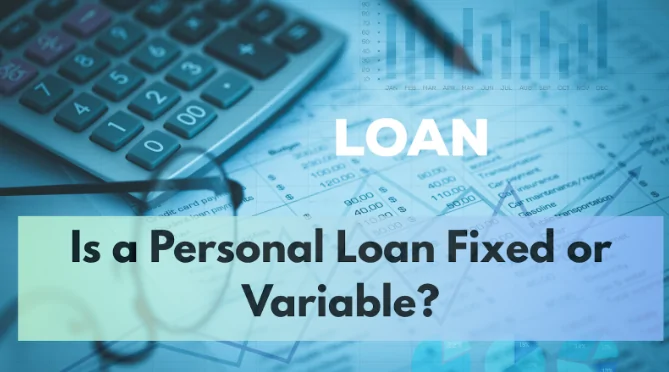One of the initial things you should find out before taking a personal loan is whether it has a fixed or variable rate. With things moving quickly in finance by 2025, learning about your loan’s interest rate is crucial since it can affect your expenses in the long run. Finding out if your personal loan offers a fixed rate or a varying rate is necessary to make smart financial choices in 2025. Since there are many ways to borrow today, the kind of interest rate structure you use can change your monthly payments, interest charges over time and how comfortable you are financially in the future. Things such as inflation, monetary policy and competitors in the lending industry have strong impacts on interest rates, so borrowers need to be informed. By being smart, you guarantee that your loans are well managed and your finances are peaceful. With this guide, you will learn how fixed and variable loan rates differ, how each function and figure out which suits you better.

Table of contents
What Are Fixed and Variable Interest Rates?
It’s necessary to learn what each rate stands for before weighing up the pros and cons.
- Fixed Interest Rate: Once approved, the loan will have the same interest rate until it is repaid. Once you commit to the loan, both your interest rate and the monthly payment amount will not change.
- Variable Interest Rate: Due to the varying benchmark interest rate, a variable interest rate can slide up or down throughout the term of the debt. Whenever changes occur in the economy, your payments could change each month.
Is a Personal Loan Fixed or Variable in Canada?
Canadian consumers can receive fixed or variable personal loans depending on which lender and product they are looking at. In general, traditional banks and credit unions allow customers to choose between them. A greater number of online lenders now provide rate options that fit customers’ circumstances.
Typical Loan Structures in 2025
- Fixed-rate personal loans: Banks usually give fixed-rate personal loans to people who prefer stable payments.
- Variable-rate loans: Fintech and online lenders usually promote variable-rate loans by advertising very low starting interest rates.
Fixed vs. Variable: Pros and Cons
Pros of Fixed-Rate Loans
- Predictable monthly payments
- Easier to budget
- Protection from rising interest rates
Cons of Fixed-Rate Loans
- Slightly higher initial rates compared to variable options
- Less flexibility if interest rates drop
Pros of Variable-Rate Loans
- Lower initial interest rates
- Can save a lot of money if rates remain low
Cons of Variable-Rate Loans
- Uncertainty in monthly payments
- Risk of increasing payments if benchmark rates rise
Is a Variable or Fixed Rate Better in 2025?
The answer is rely on your financial situation, your willingness to take risks and predicted interest rates.
Consider a Fixed Rate If:
- You have a tight monthly budget
- You plan to hold the loan for its entire term
- You prefer consistency
Consider a Variable Rate If:
- You anticipate paying off the loan early
- You can manage fluctuations in monthly payments
- You expect interest rates to decline or remain stable
How Lenders Determine Your Interest Rate
Let’s discuss the terms that can affect the interest rate on your loan. It depends on these terms that your loan will be fixed or adjustable.
- Credit score: Good credit scores allow you to enjoy better interest rates.
- Loan term: Relatively short term loan can possibly result in lower rates.
- Lender type: When it comes to lender type, traditional banks tend to give fixed options, whereas fintechs may offer the option for variable rates.
Trends Influencing Personal Loan Rates in 2025
Economic Forecast
In the following years, forecasts indicate that interest rates will become more stable after the ups and downs in recent times. Although inflation is not as high as it was, central banks are careful and interest rates may not drop too much in the coming months.
Fintech Innovations
There are many companies that have new approaches to rates, flexible plans, so rates may begin as fixed and become variable over time once you follow the payment schedule.
Questions to Ask Before Choosing a Rate Type
- What is the current prime rate?
- How much can the variable rate fluctuate?
- Are there caps on the maximum interest rate?
- What’s my loan repayment timeline?
- Can I switch from a variable to a fixed rate later?
Comparing Lenders: Fixed or Variable?
Here’s how three typical Canadian lenders compare:
| Lender | Fixed Rate APR | Variable Rate APR | Flexibility |
| Bank A | 6.5% | 5.2% | Fixed only |
| Online Lender B | 6.9% | 4.8% | Fixed & Variable |
| Credit Union C | 6.3% | 5.5% | Fixed & Variable |
Tips for Choosing the Right Option
- Review Your Finances: Breakdown your financial goals and monthly cash flow.
- Evaluate Risk Tolerance: Can you afford rising payments if rates go up?
- Use a Loan Calculator: Compare total costs over the life of the loan.
- Consult a Financial Advisor: Get professional guidance if you’re unsure.
It is now most important to know whether a personal loan is fixed or variable by 2025. Since the lending market is always changing, those who want to borrow should check their financial goals, ability to tolerate risks and how the economy is doing when deciding what to choose. Choose a rate and loan that fits your budget and don’t forget to thoroughly study the deal, as well as compare and check your options.
FAQs: Fixed vs. Variable Personal Loans
Is a personal loan fixed or variable by default?
- The answer will depend on which lender you speak to. With most banks sticking to fixed, fast online lenders tend to put variable loans first.
Can I change from a variable to fixed later?
- Rate-switching is sometimes available from lenders, though there are no promises. Never sign the documents until you have reviewed them carefully.
What happens if interest rates rise?
- Your payments won’t change when you have a fixed-rate loan. Your payments with a variable-rate loan may rise.
Are fixed-rate loans safer?
- Yes, this is a major advantage when the rates keep changing without warning.


